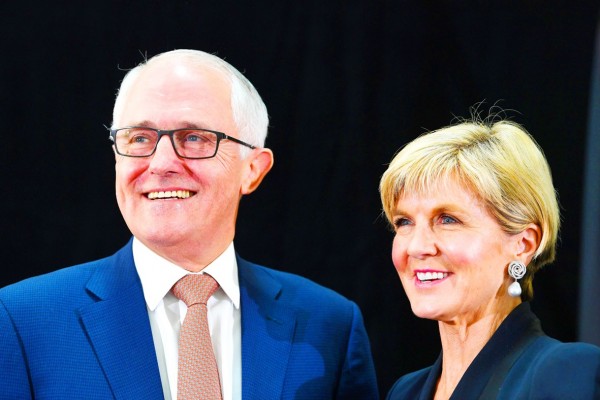《TAIPEI TIMES》 Australia urges US engagement in Asia as China rises

Australian Prime Minister Malcolm Turnbull, left, and Australian Minister for Foreign Affairs Julie Bishop attend the official launch of a government white paper in Canberra yesterday. Photo: EPA-EFE
/ Bloomberg
Australia is concerned that China’s military expansion in the South China Sea will lead to clashes in Asia and wants the US to remain involved in the region, according to a new policy paper released by the government.
The balance of power would shift to Beijing should the US withdraw its political, economic and security ties, according to the foreign policy white paper, the first in 14 years.
Australian Prime Minister Malcolm Turnbull called the document “clear-eyed and hard-headed,” and said Australia would seek a bigger role in shaping regional affairs.
“In the past we could safely assume that the world worked in a way that suited Australia,” Turnbull told reporters in Canberra yesterday.
“Now power is shifting and the rules and institutions are under challenge,” he said. “We are experiencing unprecedented prosperity and opportunity, but the liberal, rules-based order that underpins it all is under greater stress than at any time since its creation in the 1940s.”
“This is the first time in our history that our dominant trading partner is not also a dominant security partner,” Turnbull said, referring to China.
US President Donald Trump’s withdrawal from the Trans-Pacific Partnership trade pact in favor of an “America first” approach to the US economy has left Asian governments questioning his commitment to the region.
Australia has sought to balance its military alliance with the US, which has as many as 2,500 marines stationed in the country, and China, a key buyer of its resources such as iron ore and coal.
“Australia is particularly concerned by the unprecedented pace and scale of China’s activities,” the white paper said. “Australia opposes the use of disputed features and artificial structures in the South China Sea for military purposes. Elsewhere in the region, Australia is concerned about the potential for the use of force or coercion in the East China Sea and Taiwan Strait.”
The Australian government’s comments on the South China Sea were “irresponsible,” Chinese Ministry of Foreign Affairs spokesman Lu Kang (陸慷) said at a regular briefing in Beijing, the state-run Global Times reported.
All nations in the region seek to maintain peace in the waterway, using bilateral channels to keep a lid on their differences, he said.
“Australia is not a claimant to the South China Sea and the Australian government has repeatedly stated that it does not hold a position on the South China Sea disputes,” Lu said. “We urge Australia to abide by its own commitments and stop making irresponsible statements on the South China Sea issue.”
The US has criticized China for land reclamation and other moves to assert control over areas also claimed by Taiwan and Southeast Asian countries.
Successive US administrations have expressed concern that China’s activities would disrupt freedom of navigation in major global shipping lanes — an assertion that Beijing rejects.
Chinese President Xi Jinping (習近平) has strengthened China’s military while also seeking to reassure the region that his government would not seek hegemony.
“Like all great powers, China will seek to influence the region to suit its own interests,” the white paper said. “As it does, a number of factors suggest we will face an increasingly complex and contested Indo-Pacific. Compounding divergent strategic interests as China’s power grows, tensions could also flare between them over trade and other economic issues.”
“Australia will continue strongly to support US global leadership,” the white paper said, adding that there is a debate within the US about the costs of its international presence.
“We believe that the United States’ engagement to support a rules-based order is in its own interests and in the interests of wider international stability and prosperity,” the paper said. “Without sustained US support, the effectiveness and liberal character of the rules-based order will decline.”
新聞來源:TAIPEI TIMES











